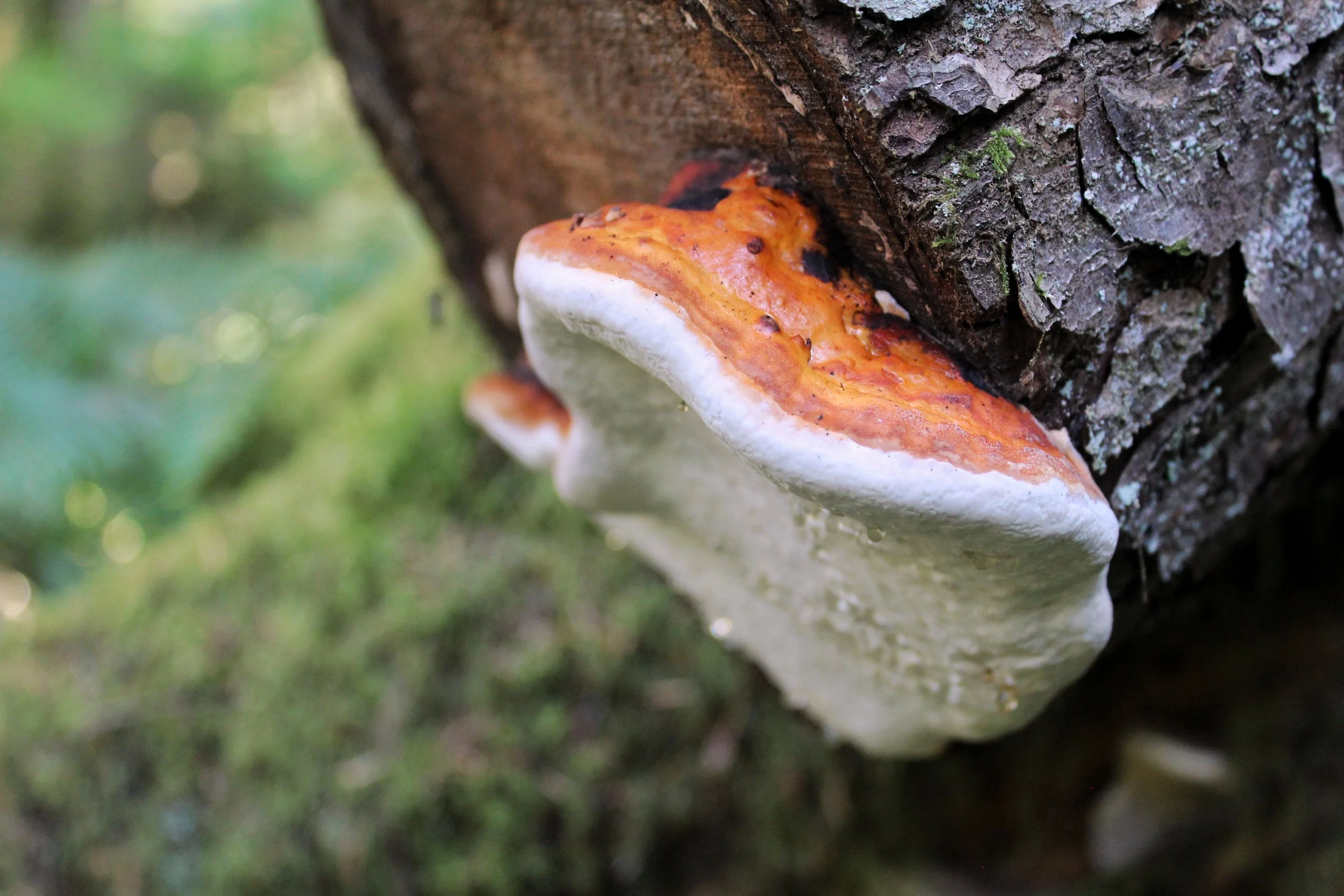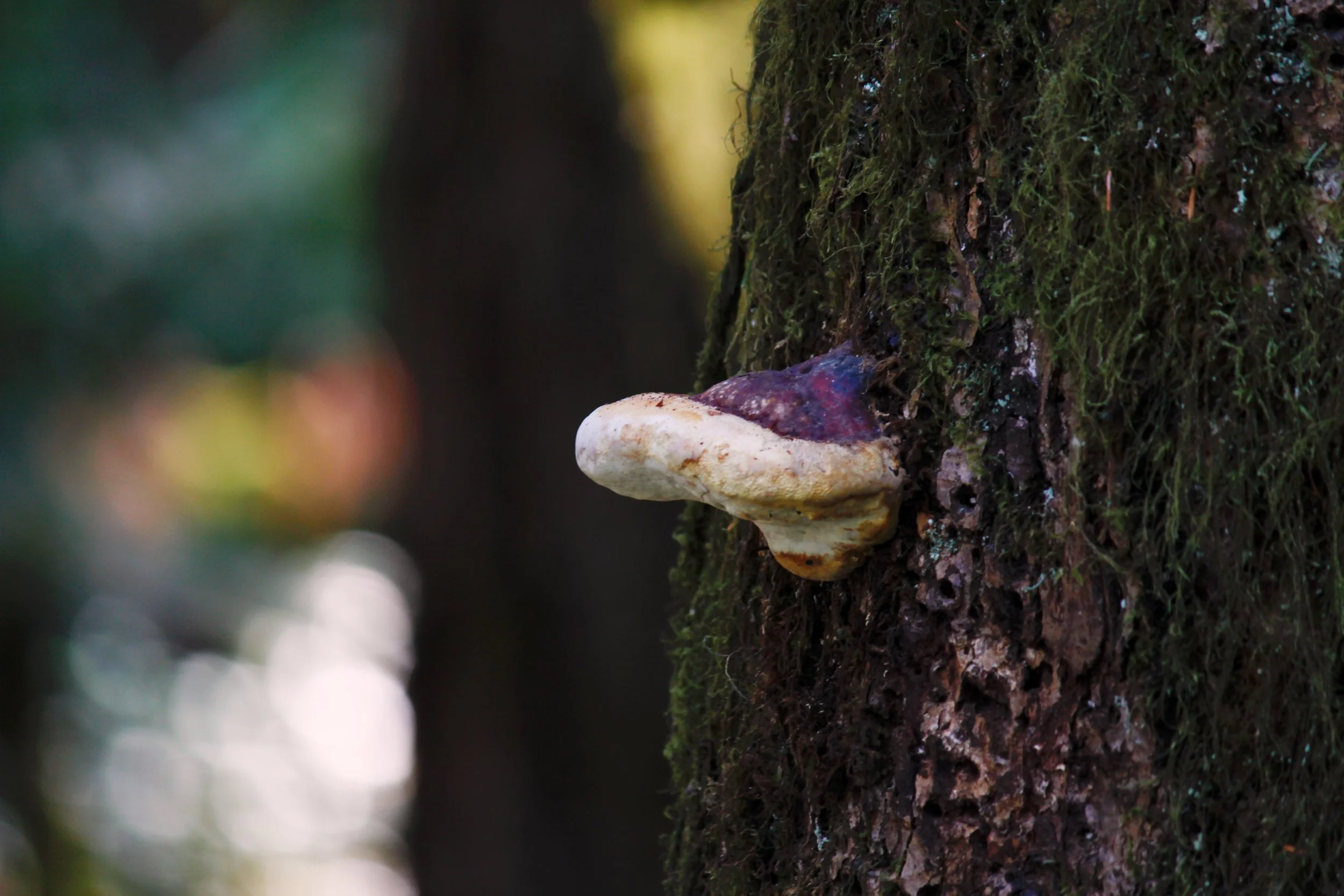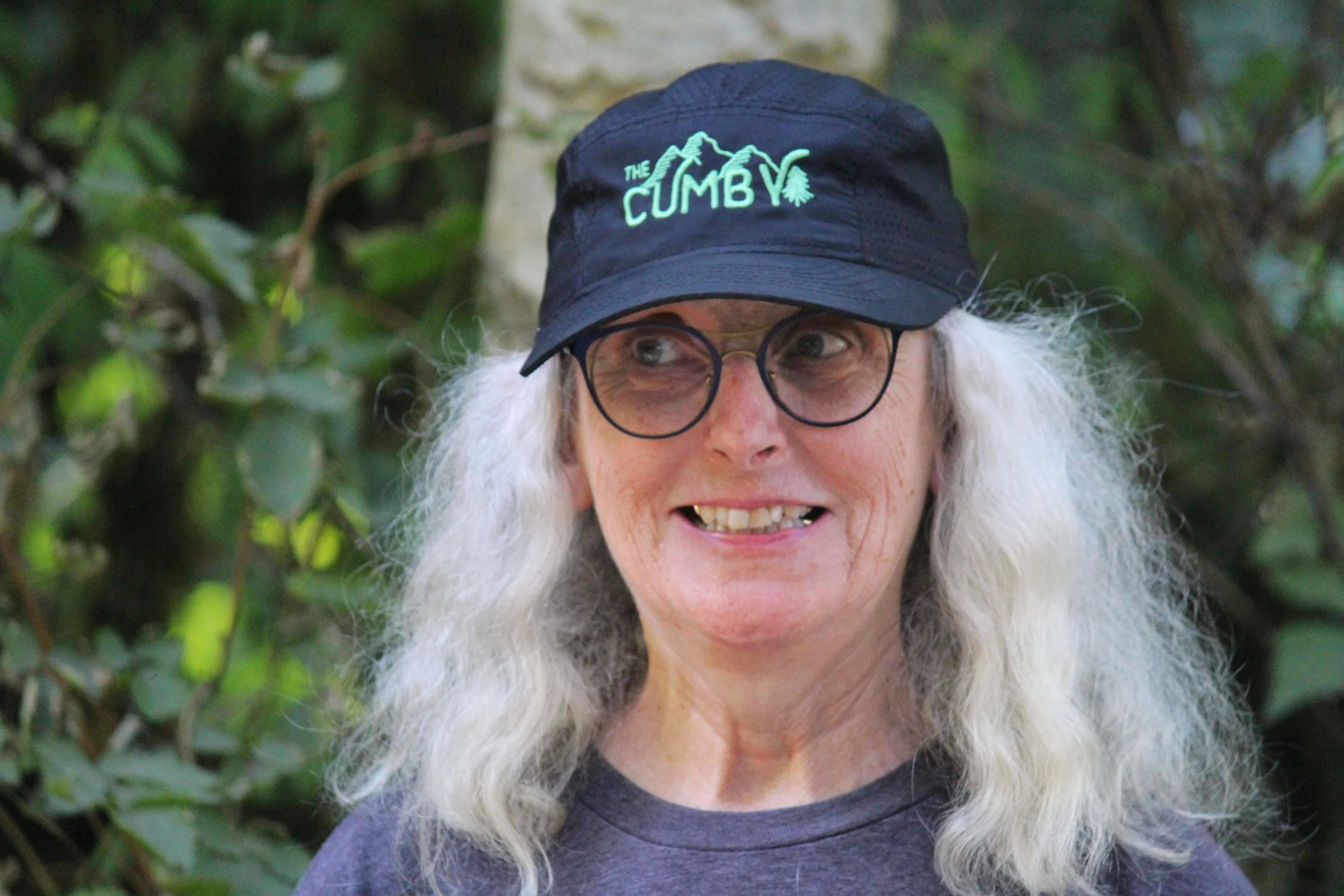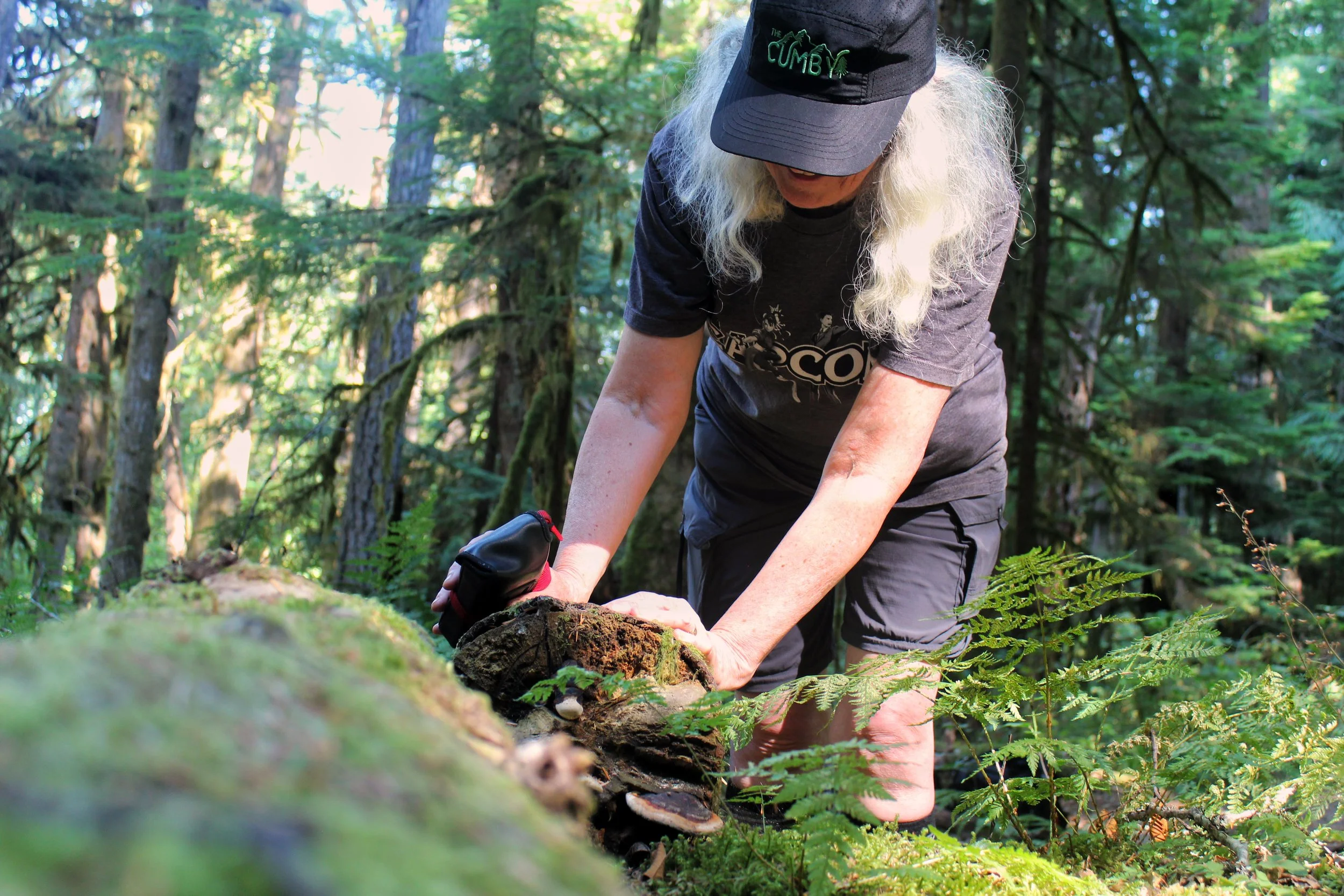Cumberland conk could become world’s first Official Village Fungus
Fomitopsis mounceae is a perennial bracket fungus that grows larger every year, with its primary growth spurts occurring in the wettest weather, during spring and fall. Photo: Heather Watson / CHLY 101.7 FM
“I mean, I looked it up and nobody has an official fungus. Why, why can't we start a trend?” Dawn Copeman, local historian and forest enthusiast, has written to the Village of Cumberland proposing a new title be declared: Official Village Fungus.
“I just think for me, there's just so much gloom and doom in the world right now that it's just, for me, it was just a lighthearted way of acknowledging how special this community is and trying to bring a smile to people's faces,” Copeman said.
Copeman said she was walking in the Cumberland Forest one day, idly thinking about symbols to build community, when the idea of a Village Fungus occurred to her.
“I was also thinking about the provincial flower of Newfoundland, which is a pitcher plant, which is a carnivorous plant you know, so there's this juxtaposition, and so I thought, oh, if I have— if I propose a fungus that has historic connections to Cumberland, but it's a decomposer. It's not really a forester's friend, but it's also a forest recycler. It is about rejuvenation, about the continuity of forest. So I thought it was a really appropriate proposal for the village,” Copeman said.
Fomitopsis mounceae is an indicator that a tree is unhealthy, as its main source of nutrients is dead, diseased, and dying trees. Photo: Heather Watson / CHLY 101.7 FM
And she has just the fungus for the job; a red belted conk, scientifically named Fomitopsis mounceae. The name is a tribute to Dr. Irene Mounce, a pioneering scientist in mycology and plant pathology, who was born and raised in Cumberland before moving to Vancouver where she later began her academic career. Her father was the first mayor of Cumberland, and a mill owner.
“So she was around wood her entire life,” Copeman said. “She was in Haida Gwaii in the 1920s getting conk samples as a young woman, you know, it's just, and it, it wasn't— it was definitely a road less traveled and she just spent her whole life studying tree pathogens.”
It isn’t just the connection to Dr. Mounce that Copeman sees connecting this red belted conk to Cumberland; it has its own characteristics that she sees as befitting the village.
“I wanna call it a decomposer, but it's actually a forest recycler and it attacks the heartwood and the cellulose within the trees themselves, diseased trees, and it basically brings it back down to very simplified organic matter to rejuvenate the forest and grow more trees,” Copeman explained.
Copeman said this fungus has been referred to as a “small-scale disturbance agent” because one small fruiting body can take down the commercial viability of an entire tree.
“I think that Cumberland has always punched above our weight when it comes to being outsized in our, not maybe just our opinion, but you know what– we have such heart in this community. I mean, we bought a forest! You know, that's gotta be something that you've gotta be proud of,” she said. “It's an amazing community. I've lived here over 30 years and still love it.”
Dawn Copeman goes by @cumberlandforesthag online, reclaiming the term from its disparaging connotation to its truer meaning, a knowledge keeper of the community. Photo: Heather Watson / CHLY 101.7 FM
Cumberland Village Council discussed the proposal in a meeting September 2nd, where Mayor Vickey Brown referred to the petitioner as “the legendary Dawn Copeman.” The conversation was favourable toward recognizing a figure from Cumberland’s history, but hesitant to make a decision naming an official fungus. One concern raised by Councillor Nick Ward was that, as Cumberland has no other official items, it is unknown how much work this would create for staff. Councillor Troy Therrien’s concern was whether this is something more than one person is interested in, or whether requests for various official village items will be coming in from individuals one at a time.
“I think I need to have a groundswell of support that says, yes, we'll support this position. This is a unique community, we have to have a unique way of telling the world how unique we are, and by having the first municipal official fungus would be the way to do that obviously,” Copeman said.
Dawn Copeman added that if the village decides against naming an Official Village Fungus, there are other routes available.
“I did discover during my research that the BC government does not have an official fungus. So we might just bump it upstairs and go all in for the BC government, because they have a fossil and the fossil was actually initiated by people in Courtenay for the [Traskasaura],” she said.
If Cumberland were to name the red belted conk the Official Village Fungus, Copeman has some fun ideas for ways to incorporate it into the village identity, anywhere from stickers, to t-shirts with clever puns, to playful uniforms:
“Maybe even epaulettes that the village officials could wear at meetings that would look like bracket fungus. I mean, the possibilities are endless. I mean you'd obviously, you don't wanna make government a joke, but I think to have a little bit of levity is a good thing.”
Copeman would like to see the world’s first Official Village Fungus unveiled at the annual Cumberland Fungus Fest, taking place October 2nd through 5th. Run by the Cumberland Community Forest Society, all proceeds from the Fungus Fest support land protection, stewardship and education.
Copeman first became interested in fungi by walking in the forest, something she does with her dog every day for her own mental health. Photo: Heather Watson / CHLY 101.7 FM
Cumberland has a unique relationship with its forest, which the Cumberland Community Forest Society has purchased piece-by-piece from logging companies, protecting it for future generations in perpetuity. This mature forest feeds biodiversity, allowing flora, fauna, and fungi to thrive in the village’s own backyard. Could an Official Fungus represent the culture and community of this forest town?
“If people wanna support my initiative, I would suggest you contact the village council and that would be info@cumberland.ca and just say, ‘I support Dawn's initiative’ and your name and your address. And that's it! You don't have to say anything else,” Copeman said. “And if we get 50 emails that might trigger something within the– I know that they, it's gone back to staff and I don't wanna make it a make-work item. It would be nice if it was a nice, easy process, but because of course it hasn't been done before, we can make the process!”
Funding Note: This story was produced with funding support from the Local Journalism Initiative, administered by the Community Radio Fund of Canada. Reporting done in the Comox Valley is done in partnership with CVOX.




